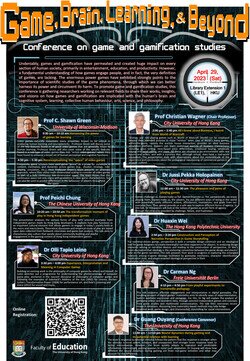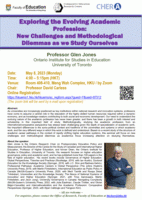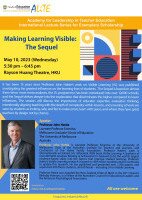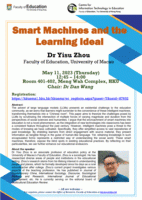“Game, Brain, Learning, and Beyond” Conference on game and gamification studies
Conference/Forum/Meeting, Lecture, Others
Date
April 29, 2023 (Sat)
Time
9:20 AM - 6:00 PM
Location

“Game, Brain, Learning, and Beyond”
Conference on game and gamification studies
Undeniably, games and gamification have permeated and created huge impact on every section of human society, primarily in entertainment, education, and productivity. However, a fundamental understanding of how games engage people, and in fact, the very definition of games, are lacking. The enormous power games have exhibited strongly points to the importance of scientific studies of the game phenomena, through which we can better harness its power and circumvent its harm. To promote game and gamification studies, the Faculty of Education, The University of Hong Kong (HKU) is organising this conference to gather researchers working on relevant fields to share their works, insights, and visions on how games and gamification are implicated with the human’s brain and cognitive system, learning, collective human behaviour, arts, science, and philosophy.
Date: April 29, 2023 (Saturday)
Time: 9:20 am – 6:00 pm
Venue: Library Extension 1 (LE 1), The University of Hong Kong
Time | Programme | Speaker |
|---|---|---|
9:20 am – 9:30 am | Opening introduction |
Dr Guang Ouyang (Conference Convenor), Faculty of Education, HKU |
9:30 am – 10:10 am | Harnessing the power of games for learning
Video games naturally instantiate many properties known to be critical in producing human learning and neuroplasticity. Professor Green will discuss some of the key features found in all good video games that are generally linked to human learning. Professor Green will also cover some of the specific features found in a sub-type of video games they dub “action video games,” which they have found to enhance a broad set of human perceptual and cognitive functions. |
Professor C. Shawn Green |
10:20 am – 10:50 am
| The transformation moment of play in Hong Kong independent games
This presentation analyses the various forms of play with selected examples from independent games made by Hong Kong developers. It explores how play functions as an important cultural element that allows gamers to engage in today’s society both at the micro and macro levels. Theoretical discussion and empirical study of play are based upon data collected from fieldwork interviews and game text analysis. The talk aims to characterise play culture that speaks about community building and playful engagement in the gaming context of Hong Kong independent games. |
Professor Peichi Chung |
11:00 am – 11:30 am | The pleasures and pains of playing games
Games challenge us. Games make us fail. Games frustrate us. Yet, paradoxically, we enjoy playing them. Games make us, the players, try out different ways of being in the world with potentially vastly different actions, affordances, motivations, and goals from our everyday lives. Thus, games provide us a safe way to explore different forms of agency. In this talk, Dr Holopainen will look at the notion of games as an art form of agency through the pleasures provided by challenge, failure, and frustration. |
Dr Jussi Pekka Holopainen School of Creative Media, City University of Hong Kong (CityU) |
11:40 am – 12:10 am | Neural dynamics during gaming and its potential relation with learning
The brain's response to external stimulus follows the pattern that the response is stronger when the stimulus is more salient, relevant, and unexpected. And stronger brain response leads to better memorisation. However, the brain quickly adapts to repeated and predictable information. Interestingly, gaming appears to resist such adaptation. Dr Ouyang will show how different the neural dynamics during gaming are from non-game activities and what may account for the difference. |
Dr Guang Ouyang |
| Lunch break | ||
2:00 pm – 2:40 pm | All I know about Business, I learnt from World of Warcraft
Strategy and role-playing games such as World of Warcraft (WoW) can be employed beyond their intended purpose in more “serious” ways. One of WoW’s many games-within-the-game, namely the auction house interaction, provides an ideal business simulation platform. Gamers can learn numerous aspects of business transactions, including price setting, time-based price differentials, emotional buying, wholesale buying and retail selling, and more. All these are situated in an environment with real buyers and sellers, and with a currency that, although virtual, does have a real-world equivalent. The presentation ends with observations about the verisimilitude of the experience and conclusions about the pedagogical repurposing of commercial games in a broader context. |
Professor Christian Wagner |
2:50 pm – 3:20 pm | Construction and Perception of Narrative Perspective in Game Storytelling
For narrative-driven games, perspective is both a complex design construct and an ideological tool for game designers to create meaningful narrative experience for players. In analysing design elements serving as narrative devices and leading to the construction of perspective, Dr Wei’s team discovered that ideology is the anchoring connection between the game design and players’ take on the game narrative. This talk presents their work in progress in exploring the entangled relations among in-game ideology facilitated by gameplay mechanics, character identification, focalisation style, and player-enacted ideological perspective in their gameplay performance. |
Dr Huaxin Wei |
3:30 pm – 4:00 pm | Experience, Interpretation and Meaning in Computer Games
Flashbang grenades are a common feature in the weapon arsenal in first-person shooter (FPS) computer games. While they cause only marginal in-game damage, they help highlight a certain ambiguity in the structure of experience of computer game play. If the player-character happens to be too close to a flashbang grenade explosion, the computer game screen goes all white, and the computer speakers begin to emit a high-pitched continuous tone. While this is technically true, intuitively it makes more sense to describe their effect as making the player temporarily deaf and blind, even though the player, as a human being, continues to see and hear perfectly well outside the game. This observation prompts a number of questions: Who am I in a computer game – the one becoming blind, or the one seeing a white screen? How is being “I” in a computer game different from being “I” in a virtual world or in a movie theatre? Which part of this “I” is from me, and which part from the computer game artifact? How am I embodied in a computer game? In what kind of space does that embodiment happen? Most importantly: How can I perceive, experience, and know in computer games? If we play the same computer game, are we two “I”s in the same way; do the two of us perceive, experience, and know in similar ways? In other words, what are the conditions of possibility for subjective and intersubjective experience and interpretation of computer games as a technologically and medially specific form? These are questions related to the discourse of phenomenology.
Building on existing work in the philosophy of computer games by others and himself, Dr Leino sketches out a programme for understanding the phenomenology of computer game play, anchored in the nascent discourse of philosophy of computer games and following the examples of Sobchack's Address of the Eye (1992) for cinema, Fischer-Lichte's Transformative Power (2008) for performance art, and Ihde's Listening and Voice (2012) for sound and music. |
Dr Olli Tapio Leino |
4:10 pm – 4:40 pm | From playful experiments to transmedia pedagogy This talk examines affective engagement and interpretation in digital gameplay. The resulting account of digital games’ materiality aims to identify ways of experimentation, both in aesthetic expression and pedagogy. For this, Dr Ng will explain the analysis of gameplay videos and biometric data, through selected independent games and concepts from game studies and multimodal communication. The talk then overviews recent research initiatives, discussing how materiality-based methods may help bridge empirical work, game design, and (transmedial) storytelling for social interventions. |
Dr Carman Ng |
4:50 pm – 5:30 pm | Reconceptualizing the “space” of video games
Frequently, game scholars have used game “genre” as a proxy for variations in content, mechanics, and dynamics across games (e.g., shooter, strategy, role-playing, simulation, etc.). Here Professor Green’s team presents an alternate approach, where they utilise multi-dimensional scaling to consider all video games as part of a fully continuous low-dimensional space. The team shows that this continuous space not only aligns with gradations in clear game characteristics, but can also be used to predict differences in the behaviour of players throughout the space. |
Professor C. Shawn Green |
5:30 pm – 6:00 pm | Open discussion | |











